We have officially welcomed February, the month when we are sick and tired of being cooped up during another Nebraska winter and the highly anticipated spring weather is right around the corner. This is a notoriously awkward month when everyone, young or old, is trying to stay active and pass the time until finding something to do is as simple as stepping outside and taking a walk or doing some gardening. Furthermore, it is a time when we have just seen our senior relatives for the holidays and we are assessing whether they are doing just fine at home or whether other care options should be evaluated to keep them active and safe. Directly after the holidays and before nicer weather emerges, it is a crucial time for seniors to stay busy and active as loneliness, isolation, boredom and depression are a major concern. As such an important focus point, there are many local communities and resources for seniors whose mission is to keep them safely engaged in meaningful and entertaining activities.
The holidays are frequently a time for realistically evaluating the current condition of senior family members, addressing any concerns, and finding the best solutions available for the level of care needed. Deb Welk, VP of Health Care Services at Immanuel says, “Over the holidays there is often an ‘AHA’ moment when out-of-town family members or friends observe a change in what is considered to be normal behaviors for their loved one. Maybe these are unpaid bills sitting on the desk, dishes not being washed or normal housework that appears to have gone undone for a long time, expired prescriptions, or a decline in their care with appearance and grooming—these are all clearly visible red flags that in home assistance or a higher level of care is necessary. Rather than waiting until the last minute to find the appropriate solution for these problems, I advise people to do their homework in advance. This includes familiarizing yourself with different levels of care and what services are provided at each. At Immanuel, we offer a full continuum of care options including independent living, assisted living, and memory support within Immanuel’s retirement communities. In March of 2014, Immanuel will complete the acquisition of Immanuel Fontenelle Home and The Lighthouse which provide skilled care and long term care in Omaha. It is important to know which is which and what the differences are at each level of care. Each level of care takes into account what the individual can do for themself, where they need assistance, and the degree of assistance that they require. It’s all about peace of mind and our complete continuum of services take into account the wide variety of needs for a very diverse senior population.
I am a strong proponent of individuals and their families visiting several different communities. Sometimes in-home care is the first step, but for socialization, group activities and the opportunity to engage with others on a daily basis, independent or assisted living communities are a great fit. When seniors are isolated, there is the presence of loneliness, helplessness and boredom. This causes a domino effect, leading to further seclusion from not going out or engaging socially, loss of focus on regular meals and normal daily activities, and subsequently loss of weight and decline in physical, mental, and emotional health. Too many times I see families who ‘didn’t see it coming’ and are forced to make quick decisions that may not be the best. It is so important to be proactive as opposed to reacting after a crisis. This extra time provides the opportunity to make on-site visits, well thought out decisions, and to seek out resources and learn more about all of the options available. In doing that, it also helps you match the benefits you are looking for and what your needs are with a particular community. In addition to scheduled visits, I recommend that you stop by in the evening or on a weekend and experience the operations in order to evaluate what the community is like throughout the day and the week. Even visiting a year ahead of time isn’t such a bad idea, as you can never be too prepared. At Immanuel our actions are based on our mission: ‘Christ-centered service to seniors and each other.’ We truly strive to make sure this belief is reflected in everything we do.”
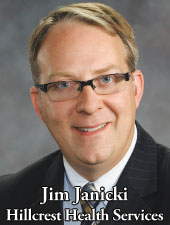 Jim Janicki of Hillcrest Health Services also advises, “Anytime family members notice a health decline in a loved one, they should take action. Never assume it’s a phase or that the situation will improve with time. A loved one spending the majority of time at home alone, without a social outlet, will rarely experience an improvement in physical or mental health status. Aging adults need mental stimulation to keep the mind sharp and ward off the potential effects of dementia. Some options include attending programs at a senior center or adult day services program, moving to an active living community, or socializing and playing games with an in-home companion.
Jim Janicki of Hillcrest Health Services also advises, “Anytime family members notice a health decline in a loved one, they should take action. Never assume it’s a phase or that the situation will improve with time. A loved one spending the majority of time at home alone, without a social outlet, will rarely experience an improvement in physical or mental health status. Aging adults need mental stimulation to keep the mind sharp and ward off the potential effects of dementia. Some options include attending programs at a senior center or adult day services program, moving to an active living community, or socializing and playing games with an in-home companion.
I always recommend that family members have the discussion with their loved one and express their concerns, where they explain what they have noticed about their loved one’s recent health and ask questions about what solutions may be available. By asking questions, you can help your loved one come to the right conclusion rather than telling him or her what he or she ‘should’ do. If your loved one is resistant or stubborn, it’s time to enlist their doctor’s help. Doctors are trusted by aging adults and their opinions are followed more than those of their adult children.
Hillcrest offers a full array of services for aging adults because there is no single option that fits everyone. For example, Hillcrest offers beautiful independent and assisted living residences for those who need the safety and support of 24 hour staffing, while others who want to remain living at home rely on Hillcrest Home Care for in-home support ranging from 2 hours to 24 hours a day depending on needs. For other advice, you can call any one of Hillcrest’s family of services. See hillcresthealth.com for a list of locations and phone numbers or email info@hillcresthealth.com.”
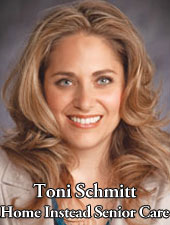 As a resource for seniors and their loved ones, Toni Schmitt of Home Instead Senior Care expands on the value of good communication when making important decisions for the future:
As a resource for seniors and their loved ones, Toni Schmitt of Home Instead Senior Care expands on the value of good communication when making important decisions for the future:
“Hopefully the holidays were filled with joy and conversation for everyone. Spending quality time together helps us to connect and open those lines of communication. If you came across areas where you see there could be some improvement, hopefully that was or will be discussed. If there are some areas of doubt which bring up questions, please don’t hesitate to reach out to Home Instead Senior Care and ask for assistance. Our office is one that likes to be to be a resource for families navigating through these times and conversations. Our goal is to open the lines of communication and help provide alternatives for keeping your loved one in whatever they call their home happy, healthy and engaged. We want them to be a part of this decision process so that they still have a voice in their care.
It is an amazing feeling to discover where seniors would like or will accept assistance and then see them receive it. The joy and sense of ease that comes from seeing your loved one receive services where they have proper meals, assistance around the house and are able to get out in the community to stay engaged is priceless. Our goal at Home Instead Senior Care is to see your loved ones safely receiving that one-on-one care that is vital to their well-being, and witness the family bonds strengthen. Our CAREGivers are extensively trained to assist our clients with their specific needs while keeping them as engaged and active as possible. We aren’t there to take over, but rather encourage them to remain independent. We are there to help families get back to having conversations that aren’t around tasks that need to be accomplished.
Home Instead Senior Care offers many services, including classes about various topics of interest such as injury prevention, senior fraud protection, Alzheimer’s family education and other health related topics. We also hold events where they can come in and play games or engage in activities that get them out and about meeting new people. Please feel free to give us a call for a free care consultation or just to answer your questions. We would love to be able to assist you through the aging process yourself or with your loved one.”
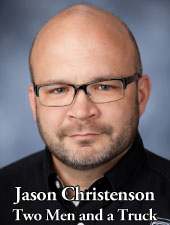 When receiving the care you need requires moving from your home into an independent or assisted living facility, Two Men and a Truck can help you make the move efficiently with as little stress as possible. Jason Christenson of Two Men and a Truck says, “We can help by not only doing the actual moving, but also by providing packing and unpacking services as needed to make the move as stress-free as possible. The best way to reduce the stress inherent in these moves is to help reduce the feeling of confusion and loss of control in the person being moved. Sometimes this means that it is necessary for them to be on hand for the move to oversee what’s going on and sometimes it means taking them someplace else altogether where they don’t even have to think about the move. On the more practical side, it means keeping track of important items (medicine, keepsakes, etc.) so that they are available when needed even if the move is still in progress.”
When receiving the care you need requires moving from your home into an independent or assisted living facility, Two Men and a Truck can help you make the move efficiently with as little stress as possible. Jason Christenson of Two Men and a Truck says, “We can help by not only doing the actual moving, but also by providing packing and unpacking services as needed to make the move as stress-free as possible. The best way to reduce the stress inherent in these moves is to help reduce the feeling of confusion and loss of control in the person being moved. Sometimes this means that it is necessary for them to be on hand for the move to oversee what’s going on and sometimes it means taking them someplace else altogether where they don’t even have to think about the move. On the more practical side, it means keeping track of important items (medicine, keepsakes, etc.) so that they are available when needed even if the move is still in progress.”
 Even though we may not have officially made it to spring, sometimes the weather is just nice enough to get outside and enjoy it. Sennora Washington, Executive Director of Hickory Villa, says, “When the weather is nice, especially during the spring months, we plan many outdoor activities and socials. We take our residents on picnic outings at local parks and take full advantage of the nice weather and being in the sun. Winter months tend to drag and with the nasty weather, we look forward to getting the residents out of the building and back involved in the Omaha community!” When asked about finding the right fit for a senior who needs a higher level of care and is unable to live at their current residence any longer, she says, “In my opinion, the most important things to consider when it comes to seeking retirement living is finances, timeline of moving, who the decision maker will be, and the services offered in the community. Having an understanding of these subjects will allow for a less stressful transition for a loved one. It’s best to look at how much money you have and exactly how long that money will last, and to find a community that will work with you when that money is all gone. Knowing who the decision makers are concerning care for a loved one will allow for easy and open communication between a community and family. Furthermore, being aware of the timeline needed to make the move successfully can help a loved one to avoid enduring any more ailments that may change their situation, and the plans that have been made, completely. Lastly, understanding the services the community offers and researching ways in which those services may be supplemented helps to avoid another costly move in the future and additional stress for the senior.” She adds, “My main concern for families is that they are prepared and have done their research. There are many benefits that go unused due to individuals not knowing they are available nor doing research to find out about them in the first place. The best advice I could give anyone looking for retirement living would be to sit down with an attorney or financial advisor who specializes in senior affairs to weigh all of your options.”
Even though we may not have officially made it to spring, sometimes the weather is just nice enough to get outside and enjoy it. Sennora Washington, Executive Director of Hickory Villa, says, “When the weather is nice, especially during the spring months, we plan many outdoor activities and socials. We take our residents on picnic outings at local parks and take full advantage of the nice weather and being in the sun. Winter months tend to drag and with the nasty weather, we look forward to getting the residents out of the building and back involved in the Omaha community!” When asked about finding the right fit for a senior who needs a higher level of care and is unable to live at their current residence any longer, she says, “In my opinion, the most important things to consider when it comes to seeking retirement living is finances, timeline of moving, who the decision maker will be, and the services offered in the community. Having an understanding of these subjects will allow for a less stressful transition for a loved one. It’s best to look at how much money you have and exactly how long that money will last, and to find a community that will work with you when that money is all gone. Knowing who the decision makers are concerning care for a loved one will allow for easy and open communication between a community and family. Furthermore, being aware of the timeline needed to make the move successfully can help a loved one to avoid enduring any more ailments that may change their situation, and the plans that have been made, completely. Lastly, understanding the services the community offers and researching ways in which those services may be supplemented helps to avoid another costly move in the future and additional stress for the senior.” She adds, “My main concern for families is that they are prepared and have done their research. There are many benefits that go unused due to individuals not knowing they are available nor doing research to find out about them in the first place. The best advice I could give anyone looking for retirement living would be to sit down with an attorney or financial advisor who specializes in senior affairs to weigh all of your options.”
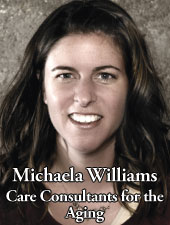 Indeed, one of the most helpful things to do when looking for care for a loved one is to have an awareness of what is available. Care Consultants produces an ElderCare Resource Handbook that offers a complete listing of senior services in the Omaha, Lincoln and Des Moines Metro areas. It can be viewed for free at www.careconsultants.com. Michaela Williams of Care Consultants adds, “Knowing that there are options and what each of the specific services entail will help in finding the right fit for your situation. If a service is not meeting your needs, then you have an awareness of what other options are available. Having an awareness of what your loved ones needs are and researching what will be covered by government programs and insurance is a good first step in finding the care they need. There are a variety of senior services available and many find themselves needing more than one option throughout their elder care journey. Care Consultants finds qualified caregivers who can help with both medical and non-medical cares. One of the biggest issues for people as they age is becoming isolated. Care Consultants can find caregivers that can help with companionship and keep seniors involved in the activities they love. Additionally, Senior Centers and Senior Living Communities host many activities that cater to those who attend and Caregivers make every effort to take seniors to the places they want to go.”
Indeed, one of the most helpful things to do when looking for care for a loved one is to have an awareness of what is available. Care Consultants produces an ElderCare Resource Handbook that offers a complete listing of senior services in the Omaha, Lincoln and Des Moines Metro areas. It can be viewed for free at www.careconsultants.com. Michaela Williams of Care Consultants adds, “Knowing that there are options and what each of the specific services entail will help in finding the right fit for your situation. If a service is not meeting your needs, then you have an awareness of what other options are available. Having an awareness of what your loved ones needs are and researching what will be covered by government programs and insurance is a good first step in finding the care they need. There are a variety of senior services available and many find themselves needing more than one option throughout their elder care journey. Care Consultants finds qualified caregivers who can help with both medical and non-medical cares. One of the biggest issues for people as they age is becoming isolated. Care Consultants can find caregivers that can help with companionship and keep seniors involved in the activities they love. Additionally, Senior Centers and Senior Living Communities host many activities that cater to those who attend and Caregivers make every effort to take seniors to the places they want to go.”
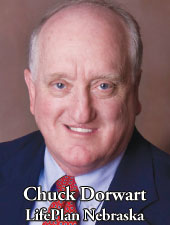 Chuck Dorwart of Life Plan Nebraska also emphasizes that the ElderCare Resource Handbook is an excellent tool for gathering information and assessing the current needs of your loved one. He says, “The Care Consultants website and resource handbook also provide information regarding locations for Geriatric Evaluation services. Families can go to the Methodist Hospital Geriatric Evaluation and Management Clinic or the Nebraska Medical Center Geriatric Medicine Clinic for private professional evaluations to assist the family in ascertaining what level of care might be required for their loved ones. Veterans can contact the VA Geriatric Evaluation and Management Clinic as well.
Chuck Dorwart of Life Plan Nebraska also emphasizes that the ElderCare Resource Handbook is an excellent tool for gathering information and assessing the current needs of your loved one. He says, “The Care Consultants website and resource handbook also provide information regarding locations for Geriatric Evaluation services. Families can go to the Methodist Hospital Geriatric Evaluation and Management Clinic or the Nebraska Medical Center Geriatric Medicine Clinic for private professional evaluations to assist the family in ascertaining what level of care might be required for their loved ones. Veterans can contact the VA Geriatric Evaluation and Management Clinic as well.
In addition to helping with the actual move, there are firms who will readily assist that family in determining what to do with the family home. It is understandably a very difficult life-changing process. Finding help with the moving process will allow seniors and their family members to focus on other things that should be done while the senior family member is still competent enough to do some planning. At the very least seniors should have basic powers of attorney in place for financial and health care matters. They should also have a HIPPA Release and a living will in place so that the family can provide assistance when the senior is not capable of handling their own financial or medical affairs. If no power of attorney documents are in place, the only way for the family to help is to have someone appointed by the probate court to handle the senior’s financial and medical decisions. It is always best that the senior chooses who they want to be there to assist them rather than having the probate court decide who should be in charge. In conclusion, the senior’s basic estate plan should include a Will, a Power of Attorney for Finances, a Power of Attorney for Health Care, a HIPPA Release, and a Living Will.” As far as seniors staying active, Dorwart adds, “Seniors should try to do what they have always done in the spring, such as staying active with their gardening, with their family, with their church, and in their community. I highly recommend that seniors consider completing their estate plan as one of the priority to-do items on their spring checklist!”
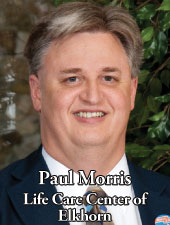 Life Care Center of Elkhorn offers skilled nursing services and in-patient or out-patient rehabilitation programs that help to restore good health and mobility so that seniors can stay active. Paul Morris, Executive Director of Life Care Center of Elkhorn, says, “We specialize in post-hospitalization geriatric rehab, and we employ our own physical, occupational, and speech therapist who all provide services seven days week. Additionally, we offer a certified therapist in the areas of lymphedema and wound care and we are the only skilled nursing facility in the area to offer a specialty program in the treatment of Parkinson’s disease. As a part of this program, we have seven therapists who are certified in the Lee Silverman Voice Treatment (LSVT) Big and Loud programs used to treat Parkinson’s disease and other neurological diseases. We also host a Parkinson’s Disease support group on the first Tuesday of every month.” He adds, “When seniors aren’t busy working towards their rehabilitation goals, we want them to stay active and have fun. We host an annual Senior Luau and also a Rehab Reunion for past patients in April. This spring we are also adding a raised garden for our patients who have limited mobility and are involved with our rehab programs.”
Life Care Center of Elkhorn offers skilled nursing services and in-patient or out-patient rehabilitation programs that help to restore good health and mobility so that seniors can stay active. Paul Morris, Executive Director of Life Care Center of Elkhorn, says, “We specialize in post-hospitalization geriatric rehab, and we employ our own physical, occupational, and speech therapist who all provide services seven days week. Additionally, we offer a certified therapist in the areas of lymphedema and wound care and we are the only skilled nursing facility in the area to offer a specialty program in the treatment of Parkinson’s disease. As a part of this program, we have seven therapists who are certified in the Lee Silverman Voice Treatment (LSVT) Big and Loud programs used to treat Parkinson’s disease and other neurological diseases. We also host a Parkinson’s Disease support group on the first Tuesday of every month.” He adds, “When seniors aren’t busy working towards their rehabilitation goals, we want them to stay active and have fun. We host an annual Senior Luau and also a Rehab Reunion for past patients in April. This spring we are also adding a raised garden for our patients who have limited mobility and are involved with our rehab programs.”
Staying Busy Until Spring
As the holidays come to an end, we often see that seniors experience a feeling of depression and loss. As the holidays are full of family, friends, activities and gatherings; this season can end with an abrupt halt for many. The key to helping with this transition is to keep your loved active and engaged with family and/or the community. This can be done by family as well as in-home care agencies, such as Comfort Keepers.
Here are some ways seniors can help alleviate the post-holiday blues:
1. Plan a getaway in February or March, especially some place warm. It doesn’t have to be a big, expensive trip to keep one’s spirits up and looking forward.
2. Make a plan to learn something new. It can be anything from yoga exercises a person can do in a chair to learning about the computer.
3. Work with family members to create visible memories of the holiday season. Collecting favorite photos and cards, and telling stories about the photos is not only entertaining, but preserves the history of a family.
4. Consider taking decorations down slowly rather than all at once. Leave a wreath on the door, or garland along a bannister.
5. The American Geriatric Society Foundation for Health in Aging recommends volunteering as a way to ease the post-holiday blues. This organization suggests calling the United Way or one’s church to learn about others who need help. One need not make a long-term, formal commitment to have a positive impact.
6. It can make all the difference as can connecting with grandkids while they have vacations from school—even if it’s by phone, email or Skype.
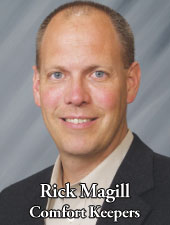 Rick Magill, owner of Comfort Keepers, advises, “The first thing to remember when noticing or assessing that a loved one may need extra assistance in their home is to take a step back and look at the big picture. Everyone selects in-home care for many different reasons. The keys are to recognize when to introduce care and how to select the right care provider. For example, the following are just a few of the questions to ask yourself or loved one. 1. Has there been a recent emotional or medical crisis? 2. Is routine house cleaning not being kept up? 3. Have there been recent falls? If you have answered yes to any of these questions, it may be time to consider in-home care. In-home care provides an excellent option for individuals who wish to remain in the comfort of their own home. We as Comfort Keepers would provide an approach to care that is focused on the ‘whole person’ and our mission is to keep your loved ones active and engaged in life. This approach is called Interactive Caregiving and it focuses on four areas of care, which are essential to maintaining senior health and independence: senior mind, body, nutrition, and safety.”
Rick Magill, owner of Comfort Keepers, advises, “The first thing to remember when noticing or assessing that a loved one may need extra assistance in their home is to take a step back and look at the big picture. Everyone selects in-home care for many different reasons. The keys are to recognize when to introduce care and how to select the right care provider. For example, the following are just a few of the questions to ask yourself or loved one. 1. Has there been a recent emotional or medical crisis? 2. Is routine house cleaning not being kept up? 3. Have there been recent falls? If you have answered yes to any of these questions, it may be time to consider in-home care. In-home care provides an excellent option for individuals who wish to remain in the comfort of their own home. We as Comfort Keepers would provide an approach to care that is focused on the ‘whole person’ and our mission is to keep your loved ones active and engaged in life. This approach is called Interactive Caregiving and it focuses on four areas of care, which are essential to maintaining senior health and independence: senior mind, body, nutrition, and safety.”
Regardless of how seniors choose to stay active and involved in their community; the fact remains that socialization and regularly scheduled events are a major part of life at any age. Furthermore, they provide a source of happiness which is directly related to maintaining balance and good health. No matter what level of care you need, there are still ways to sustain a high quality of life and be surrounded by family and friends. The most important thing to remember is to pay an equal amount of attention to all aspects of your wellbeing–physical, mental and emotional–and if you need help with one or more areas; do not hesitate to reach out to others as there is always more than one solution for any problem. Living in the present while planning for the future is essential to facing life’s many uncertainties with fortitude and grace.

